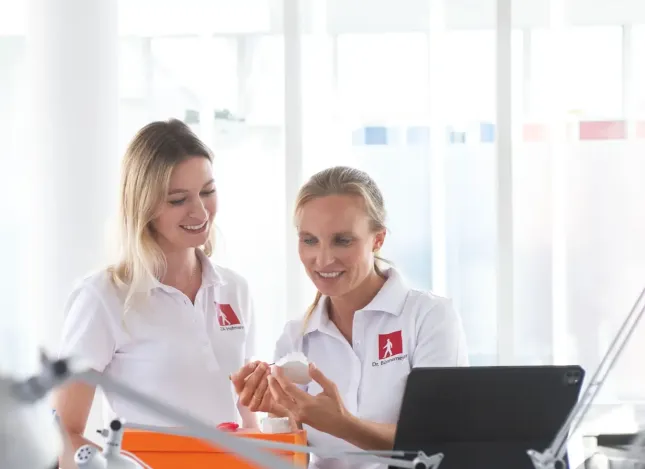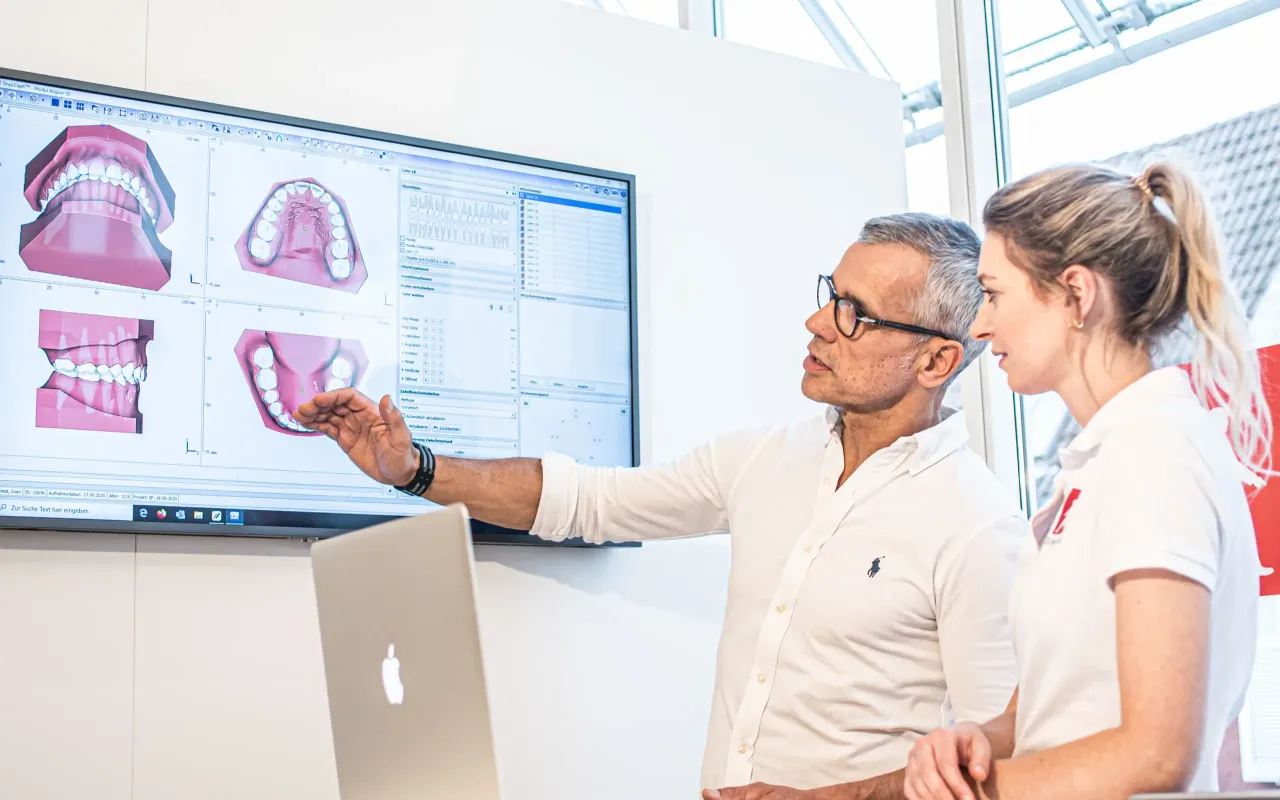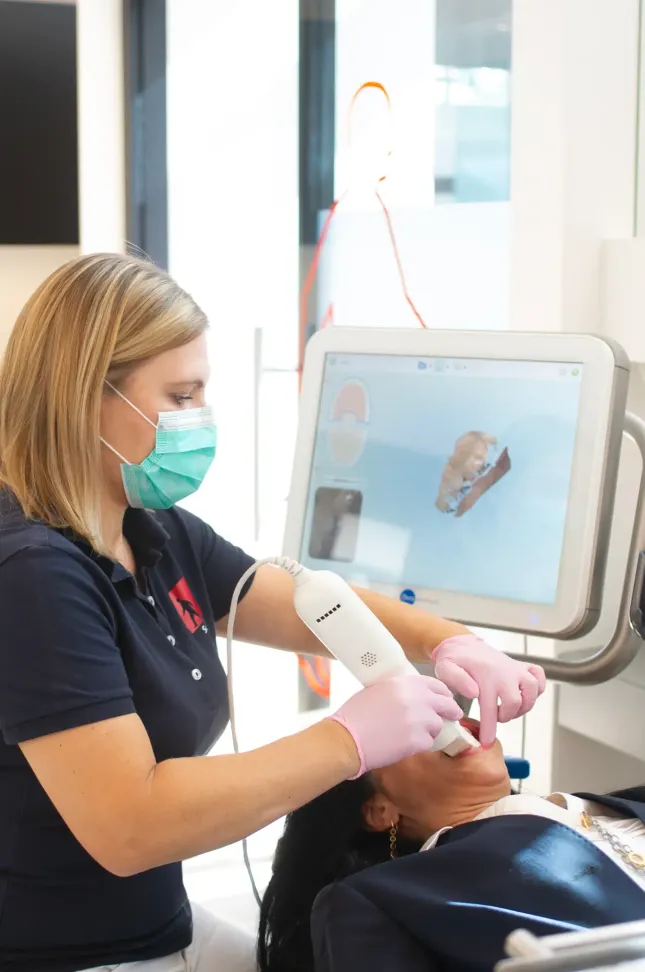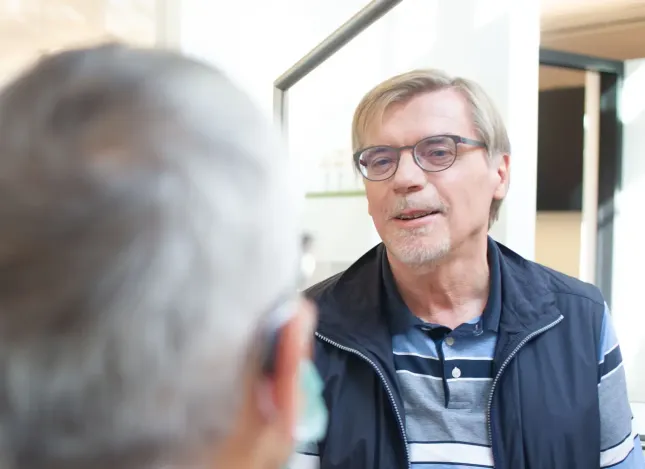
You can't study experience.
Since the establishment of our first orthodontic practice in 1997, we have been expanding our experience in the complex field of orthodontics. Every patient is individual and every treatment is a little bit different. This makes orthodontics both interesting and challenging. It is valuable and sometimes necessary to be able to draw on a wealth of experience. And it gives me great pleasure to pass this experience on to our team and the next generation of orthodontists as a training-authorized orthodontic practice.
How do I know if an orthodontic practice is really good?
Regular Advanced Training



Our practice team is excellently trained.
To ensure that we are always up to date with the latest knowledge, our employees regularly attend training courses and congresses. This way, we always have our finger on the pulse and work with the most advanced treatment methods:
- Virtual treatment planning
- Professional photo diagnostics
- Software-based tooth correction and treatment finishing
- Skeletal anchorage
- Non-compliance appliances
- 3D printing
- and much more
Our practice equipment



For excellent work, you need excellent tools.
DTo ensure that our patients receive the best possible treatment, the equipment in our orthodontic practices in Königstein and Frankfurt a.M. is state-of-the-art. This enables us to offer the complete spectrum of innovative and digital orthodontics: State of the Art - professionally and technically.
Digital from the outset!
- Digital, low-radiation X-ray
- Intraoral scanning and
- Software based case analysis
In treatment
- Digital appliance planning
- Digital design and digital progress assessment
At the end of treatment
- Digital finish with targeted set-up
- Digital 3D model printing and
- Digital planning of the retention appliances
Empathy



Empathy is not just a word for us.
Nothing works without intuition.
Teeth are usually treated for the first time at the dentist. Despite local anesthesia, many patients take one or two unpleasant memories with them to the orthodontist.
We are not only specialists in dentistry, we also understand when our small or even large patients have a queasy feeling or fear of treatment.
Orthodontic treatment is no piece of cake. But we can assure that the treatment is different than at the dentist. As a rule, local anesthesia is not necessary, because the treatment is performed on the surface of the tooth. But it also takes much longer.
We accompany our patients over many months. Even a single treatment appointment can sometimes last more than two hours.
When our patients leave the practice, the treatment is not finished, they take their braces home with them. This can be a little uncomfortable when eating. Patience is required until success is visible and the orthodontic treatment can be successfully completed. We know that.
If our patients have any complaints, we are there for them.
We listen and take our time. No matter how big or small they are - for the smallest even a little more.



How do I know if an orthodontic practice is really good?
The moment you start thinking about orthodontics, you encounter many technical terms and questions that you have never thought about before. You want the best possible treatment for your child or yourself. We cannot make the decision for you as to whether we are the practice of your choice. However, in order to help you make the best decision for you or your child, we have compiled some information to help you find your way through the wide field of orthodontics.
What training do orthodontic specialists undergo? And are there any differences?
Whether for your child or yourself, you get the best possible orthodontic treatment from doctors who have received the best possible training. There are various training paths and degrees for further education and specialization in the field of orthodontics. These differ considerably - the duration and type of the respective training allow conclusions to be drawn about the degree of qualification acquired. You do not have to grope in the dark. We shed light on the various titles and training paths for you.
Dentist specializing in orthodontics
Let's start with the quickest and easiest additional qualification. In principle, every dentist in Germany is allowed to define a treatment focus for himself or herself. A few weekend courses and proof of a few orthodontic treatments are enough to be allowed to use the title dentist specializing in orthodontics.
Master of Science Orthodontics
The training for the Master of Science in Orthodontics is somewhat more extensive. In the course of the standardization of courses of study, private universities in Germany offer further training to become a Master of Science in Orthodontics.
Dentists can also complete this training part-time. The training includes a total of 40 to 50 days of attendance at the university, which in summary would correspond to two to three months of full-time training.
The predominantly theoretical training is completed with the writing of a scientific thesis. Successful completion entitles the student to use the title Master of Science Orthodontics, but it does not entitle the student to take the examination to become an orthodontist at the Chamber of Specialists. Much more extensive training is required for admission to this examination.
Specialist in orthodontics
The additional specialist training to become an orthodontist cannot be completed part-time, but only full-time. The training lasts a total of four years and includes both theoretical and practical units. Schon die Dauer zeigt, wie umfassend diese Ausbildung ist.
Three years are spent in the orthodontic department of a university clinic and one year is spent in an orthodontic practice with training authorization. After successful examination at the Chamber of Specialists, dentists who have followed this path may call themselves specialists in orthodontics or simply orthodontists for short.
Our orthodontic practice is authorized to educate. We are pleased to pass on our knowledge and experience to the next generation of orthodontists.





